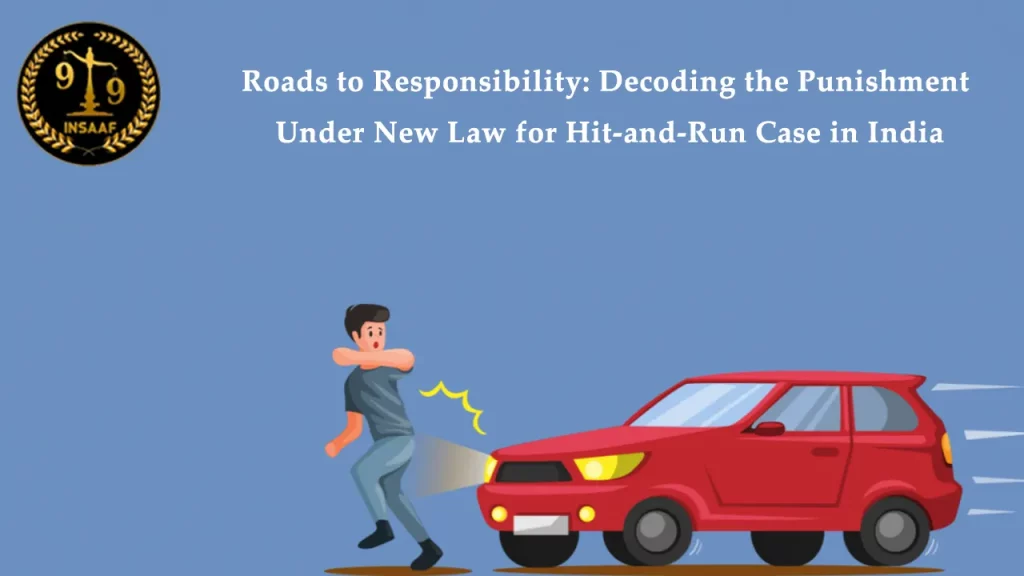

Online Legal Advice from Insaaf99® Online Lawyer Consultation in India


Online Legal Advice from Insaaf99® Online Lawyer Consultation in India

India's bustling streets, alive with the constant hum of traffic, are unfortunately marred by the harsh reality of road accidents. Hit-and-run cases, in particular, inflict deep wounds on victims and communities. Recognizing the urgent need for action, the Indian government has taken a crucial step forward by enacting a new law. This intricate legal framework seeks justice for victims and accountability for perpetrators, marking a significant stride towards safer roads and a stronger sense of responsibility on the nation's highways.
A hit-and-run isn't just an accident; it's a callous choice. Instead of stopping to help the injured, a driver vanishes into the night, leaving a trail of devastation in their wake. Families grapple with grief and communities reel from the senselessness, while the perpetrator escapes accountability.
In year 2022, the ministry of transport provided following details in their report related to road accident
Total number of accidents: 4,61,312
Fatalities: 1,68,491
Injuries: 4,43,366
Hit-and-Run cases which accounts for 14.6% of total accidents and 18.1% fatality and injuring 12.1% of injured cases. Despite all the efforts the numbers are going up in comparison to 2021 Hit-and-run accident cases are up by 17.4%.
We must demand stricter penalties and more effective investigations to deter these acts and ensure justice for those who have suffered.
Also Read: - Motor Accident Claims Tribunal, Relevant Act, and Compensation Calculations
To tackle the growing epidemic of hit-and-run accidents, the Indian government has enacted a groundbreaking law designed to provide a robust legal framework and deliver justice to victims. This legislation introduces significantly stricter penalties to deter reckless behavior and hold perpetrators accountable for their actions.
Mandatory Reporting: Any individual involved in a road accident must now report the incident to the nearest police station within a specified timeframe. Failure to comply can result in hefty fines and imprisonment.
Increased Penalties: The new law significantly strengthens penalties for hit-and-run cases. Offenders face substantial fines and potentially lengthy imprisonment, depending on the severity of the accident and the harm inflicted.
Justice for Victims: Recognizing the devastating impact on victims, the legislation prioritizes compensation. Offenders will be required to provide financial restitution to injured parties or families of those who have lost their lives.
No Escape from Accountability: The law empowers authorities to suspend the driving license of individuals involved in hit-and-run cases. This serves as a powerful deterrent and underscores the seriousness of the offense.
With this landmark law, the Indian government takes a crucial step towards safer roads and a stronger sense of responsibility on the highways.

Challenges in Securing Insurance: Individuals with hit-and-run convictions face difficulties obtaining insurance as companies hesitate to provide coverage, adding complexity and cost to vehicle ownership.
Employment Setbacks: A hit-and-run conviction can hinder job opportunities and lead to termination from current employment, extending consequences beyond legal ramifications to impact professional standing.
Social Stigma and Public Scrutiny: Hit-and-run incidents draw substantial media attention and public ire, resulting in social alienation and community disapproval for offenders.
Prioritizing Victim Compensation: The new law emphasizes compensating victims, with offenders mandated to make significant financial restitution covering medical expenses, lost income, and emotional damages.
Potential Civil Lawsuits: Beyond criminal charges, victims or their families may file civil lawsuits, seeking additional compensation for pain and suffering caused by the hit-and-run incident.
Financial Strain and Asset Loss: Offenders could face substantial economic hardship, potentially leading to the loss of assets, depending on the financial burden imposed by penalties, compensation, and civil suits.
Overwhelming Guilt and Regret: Confronting legal repercussions and societal consequences burdens offenders with intense guilt and regret, creating a lasting psychological impact.
Fear and Uncertainty: Legal proceedings and the uncertainty of the sentencing process contribute to significant stress and anxiety for the offender.
Social Isolation and Stigma: Societal stigma linked to a hit-and-run conviction can result in isolation and loneliness, adversely affecting the mental well-being of the offender.
In essence, hit-and-run convictions bring about a comprehensive impact beyond legal penalties, encompassing challenges in insurance and employment, societal stigmatization, financial liabilities, and enduring psychological consequences. The stringent legal measures underscore society's commitment to holding offenders accountable, emphasizing both deterrence and restitution.
Insaaf99, an innovative online legal consultation platform, plays a pivotal role in navigating the complexities of the new hit-and-run legislation in India. By providing accessible legal guidance and expert advice, Insaaf99 assists individuals involved in such cases, ensuring they understand their rights and obligations. This platform serves as a beacon of support, helping users make informed decisions and facilitating a smoother legal process in the aftermath of hit-and-run incidents. Insaaf99 is not just a service; it is a crucial ally for those seeking justice in the face of legal challenges.